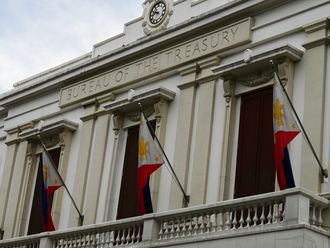Seoul: EU heavyweights Britain, France, Germany, Italy and Spain yesterday issued a joint declaration insisting that bond market jitters over a future bailout fund were misplaced, as Ireland suffers a debt crisis.
"Any new [bailout] mechanism would only come into effect after mid-2013 with no impact whatsoever on the current arrangements," the five countries' finance ministers said in the declaration, issued at the G20 Summit in Seoul.
EU leaders agreed last month to design a permanent plan of aid and penalties for Eurozone countries facing fiscal ruin, to take over after the lifespan of a current crisis response fund ends in 2013. Germany is backing a plan to force private investors to bear a share of bailout costs.
But German Finance Minister Wolfgang Schaeuble yesterday stressed that this would only take effect in three years, and should not contribute to investor fears, which have propelled interest yields on Irish government bonds to record levels. He said investors were guilty of a "total misunderstanding".
"It has to do with decisions from the European Council [EU leaders], and it's a total mis-assessment of the issues at hand... It has absolutely nothing to do with any current discussion, and you can't get them mixed up," he added.
Under serious strain
Ireland's cost of borrowing hit record highs on Thursday. Ten-year government bond yields jumped to 8.929 per cent, the highest level since the euro was created in 1999, placing Europe's bond markets under serious strain.
The leap fuelled fears that the Eurozone debt and deficit crisis could be entering a dangerous second phase just six months after a massive bailout of Greece, to which Germany was the biggest contributor.
Portuguese bond yields also hit historic peaks on Thursday.
German Chancellor Angela Merkel said on Thursday that European taxpayers should not pay the whole cost of rescuing debt-laden countries.
"Let me put it simply — there may be a contradiction between the interests of the financial world and those of the political world," she said at a G20 business summit in Seoul.
"We cannot explain to our voters and citizens why taxpayers must finance certain risks, and not those who made a great deal of money taking those risks," Merkel added.
Under Merkel's proposals, future rescue packages would only be launched if government bondholders agree to bear some losses.
However the European ministers stressed yesterday that "the EFSF (European Financial Stability Fund) is already established and its activation does not require private-sector involvement," adding that the new system from 2013 "could include a range of possibilities."












